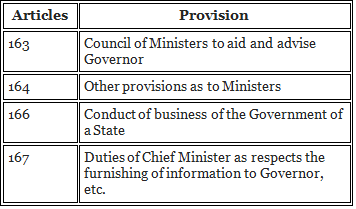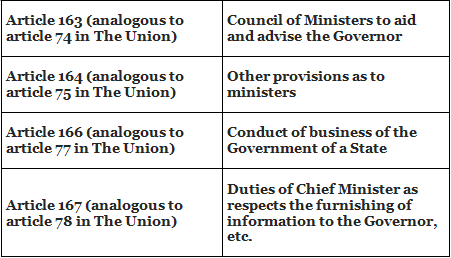State Council of Ministers - Indian Polity | Famous Books for UPSC Exam (Summary & Tests) PDF Download
Who are State Council of Ministers?
State Council of Ministers is similar to Central Council of Ministers. The state council is headed by the Chief Minister. The council comprises ministers appointed by the governor on the recommendation of the CM.
How are the Council of Ministers appointed?
They are appointed by the governor on the advice of the CM. Governor also appoints a tribal affairs minister for the following states:
- Chhattisgarh
- Jharkhand
- Madhya Pradesh
- Odisha
Note: Bihar was also one of the states to have tribal affairs minister, however, 94th Amendment Act 2006 freed Bihar from this obligation.
Composition of Council of Ministers
The size of the council is not mentioned in the Indian Constitution. Chief Minister decides the size and the rank of the ministers as per the requirement in the State Legislature.
There are three categories of Council of Ministers:
- Cabinet Ministers
- Ministers of State
- Deputy Ministers
Collective Responsibility
The provision of collective responsibility is dealt with by Article 164. The Article mentions that the council of ministers are collectively responsible to the state legislature. (To read more about the important articles in the Indian Constitution, refer to the linked article.) This means that all the ministers own joint responsibility to the legislative assembly for all their acts of omission and commission.
Note:
- When the legislative assembly passed a no-confidence motion against the council, all the ministers of the council have to resign including those belonging to Legislative Council too.
- The council of ministers can advise the governor to dissolve the legislative assembly on the ground that the House does not represent the views of the electorate faithfully and call for fresh elections. The governor may not oblige the council of ministers which has lost the confidence of the legislative assembly.
Articles related to State Council of Ministers
The following articles of the Indian Constitution are important to be read by the aspirants for UPSC 2020. These articles are attached to the council of ministers. Refer to these in the table given below:

Art. 163. Council of Ministers to aid and advise Governor: (1) There shall be a Council of Ministers with the Chief Minister as the Head to aid and advise the Governor in the exercise of his functions, except in so far as he is required to exercise his functions in his discretion
Further Article 163 requires that the said executive functions of the State will be exercised on the aid and advice of the Council of Ministers with the Chief Minister as the head, Thus, even through the Governor has appointed as the constitutional head of the State, the real authority at the State level is exercised by the Council of Ministers with the Chief Minister as its head.
Other provisions as to the formation of Council of Ministers are provided by Article 164.
Art. 164.: (1) The Chief Minister shall be appointed by the Governor and the other Ministers shall be appointed by the Governor on the advice of the Chief Minister, and the Ministers shall hold office during the pleasure of the Governor.
The Chief Minister is appointed by the Governor. The person who commands the majority support in the State Legislative Assembly (Vidhan Sabha) is appointed as the Chief Minister by the Governor. The other Ministers included in the Council of Minister’s must belong to either House of the State legislature. The portfolios to the members of the Council of Ministers are allocated by the Governor on the advices of the Chief Minister.
We shall see other provision of Art. 164 in simplified manner as below:
(1A) Provision for tribal ministers in some states: In the States of Chhattisgarh, Jharkhand, Madhya Pradesh and Orissa (Bihar was omitted by 94th amendment act, 2006), there shall be a Minister in charge of tribal welfare who may in addition be in charge of the welfare of the Scheduled Castes and backward classes or any other work.
(1A) Strength of ministers: The total number of Ministers, including the Chief Minister, in the Council of Minister in a State shall not exceed fifteen per cent of the total number of members of the Legislative Assembly of that State. It also says that the number of Ministers, including the Chief Minister in a State shall not be less than twelve.
(1B) Disqualification under 10th Schedule: A person who is disqualified for being a member of Legislature under Tenth Schedule shall also be disqualified to be appointed as a Minister; he will have to seek a fresh election in order to become a minister again.
(2) Collective responsibility: The Council of Ministers shall be collectively responsible to the Legislative Assembly of the State.
(3) Oath: Before a Minister enters upon his office, the Governor shall administer to him the oaths of office and of secrecy according to the forms set out for the purpose in the Third Schedule.
(4) Condition of becoming a member of legislature: A Minister who for any period of six consecutive months is not a member of the Legislature of the State shall at the expiration of that period cease to be a Minister.
(5) Salaries: The salaries and allowances of Ministers shall be such as the Legislature of the State may from time to time by law determines and, until the Legislature of the State so determines, shall be as specified in the Second Schedule.

Term of council of Ministers
The Council of Ministers holds its office during the pleasure of the Governor. It has no fixed term of office. The term of the Council of Ministers depends on the support of the majority members of the Legislative Assembly. If it loses majority support in the legislative Assembly, it has to resign. The Governor may also remove a Minister from the council of Ministers on the advice of the Chief Minister.
|
745 videos|1444 docs|633 tests
|
FAQs on State Council of Ministers - Indian Polity - Famous Books for UPSC Exam (Summary & Tests)
| 1. What is the State Council of Ministers in Indian Polity? |  |
| 2. How is the State Council of Ministers formed in Indian Polity? |  |
| 3. What is the role of the State Council of Ministers in Indian Polity? |  |
| 4. Can the State Council of Ministers be dismissed by the Governor in Indian Polity? |  |
| 5. How does the State Council of Ministers differ from the Central Council of Ministers in Indian Polity? |  |
















